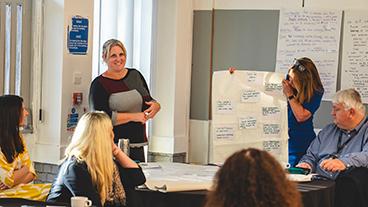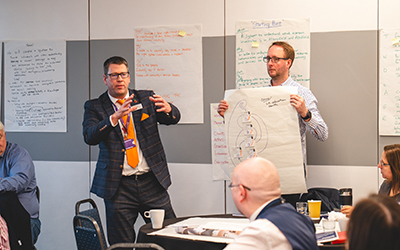Systems Thinking experts tackle economic inactivity with local leaders

Recent data shows that Mansfield, Ashfield and the surrounding area has high levels of economic inactivity. An economically inactive person is aged 16 and over do not have a job but are not categorised as unemployed because they are not seeking work, or are not available (or both).
Andrew Cropley, Principal and Chief Executive Officer at Vision West Nottinghamshire College, wanted to investigate this challenge in more detail and recognised that a number of local leaders, organisations and systems had to come together more closely as one system to help local people into education and work.
I did a leadership programme with the National Leadership Centre, which is the Cabinet Office on Systems Leadership and could really see the power of bringing systems together effectively.
I met Nicole Edgington from The Open University at an event in Cardiff and so she contacted me and asked if I’d be interested in running a systems leadership event. And obviously I was. Luckily, we managed to attract some really high-profile local leaders and some really high-quality practitioners to come and join in.” Andrew Cropley
Principal and Chief Executive of West Nottinghamshire College
Andrew invited Systems Thinking experts from The Open University (OU) to help with this challenge and arrange a day workshop at the Mansfield Civic Centre, bringing together a multitude of local education, local government, business, health, voluntary and armed forces leaders to tackle the issue. The session was attended by local MP for Mansfield, Councillor Ben Bradley and Andy Abrahams, Mansfield’s elected Executive Mayor.
Click the CC button to view subtitles or download a Word doc transcript here.
Andrew opened the day explaining that economic inactivity was an indicator of the low prosperity of a community and was the sixth highest in Great Britain. He explained it was exacerbated by low levels of pay and due to the wide range of causes, it was vital for local organisations and leaders to work effectively together – citing systems leadership as a way to achieve this goal.
Introducing Systems Thinking

The session was led by Dr Martin Reynolds, Senior Lecturer and Qualifications Lead for the OU postgraduate programme in Systems Thinking in Practice (STiP). Martin has long been involved with outreach activities including local and United Nations initiatives. Martin was joined by Dr Kris Stutchbury, Senior Lecturer in Teacher Education and, like Martin, has vast experience of working on international projects. Kris’s father, Peter Checkland, a British management scientist and emeritus professor of systems at Lancaster University, is an internationally celebrated author of several seminal books on Systems Thinking.
Opening the session, Martin and Kris explained to the attendees how systems are defined by the OU as conceptual constructs, and that systems thinking involves a continual interplay between thinking systematically (joined-up thinking in practice) and thinking systemically (getting the bigger picture). Systems Thinking enables people to understand how they are thinking about ‘a problem’ more in terms of a ‘problem situation’, enabling them to think about it differently using a variety of tools. The aim of the workshop was to explore with attendees how systems thinking ideas and tools can resonate and relate with existing professional tools, practices and expertise, so as to avoid systemic failure with the problem situation of ‘economic inactivity’.
.jpg)
Tackling the issue
Throughout the day Martin and Kris introduced the participants to the concepts of Relational Thinking, Perspective Thinking and Adaptive Thinking. This helped to understand relationships underpinning the systems, engage in different perspectives and reflection on the boundaries that are created.
The Open University has been generating systems teaching for both since 1972. It's useful for activities like today with exploring economic inactivity because very often you get siloed attention to those kinds of issues.
I think what we witnessed today at the event was an opportunity to have those kinds of conversations between different professionals, interdisciplinary, if you like, which otherwise would not take place. We're providing them with some very basic tools around diagramming, systems modelling, complex systems modelling – even within the single day workshop, which provided a space for people to creatively talk about and explore those issues.”
Dr Martin Reynolds
Senior Lecturer and Qualifications Lead for The Open University postgraduate programme in Systems Thinking in Practice (STiP)
Click the CC button to view subtitles or download a Word doc transcript here.
Developing solutions together
The attendees were invited to take part in group work and develop solutions through techniques such as the ‘TWO CAGES’ model to unfold the systems and acknowledge different stakeholders perspectives and related activities.
Andrew reflected: “The timing is brilliant because on Monday we're launching a whole set of new projects to deliver on our brand new Mansfield strategy. Some of the leaders of those project teams were in the room today and I think got a chance to put the ideas straight into practice very soon.
“I think there's an opportunity to weave some of those tools and some of that thinking into the work that we're doing. So, I'm hoping that very quickly we'll see some real impact from what we've done today.”
Theresa Hodgkinson, Chief Executive of Ashfield District Council added: “I've got about ten actions here that I'll be taking away from today. There are many toolkits out there and systems thinking is a tried and tested process.
“It's given us the processes that we can adopt and use, not just within our organisations, but how we can use them across our educational partners, local authority and the private sector to bring us all together. I'll definitely be taking the toolkit away, and the approach.”
Click the CC button to view subtitles or download a Word doc transcript here.
How Systems Thinking can help to solve your challenges
Systems Thinking has a wide range of applications to help resolve complex problem situations. If your organisation needs to think about its systems, partnerships and stakeholders in a different way, the OU can help.
As well as running a similar session to that held in Mansfield, the OU’s Systems Thinking in Practice qualifications can help your leaders upskill to deal with problematic situations and change them systemically or holistically. Qualifications include:
- Postgraduate Certificate in Systems Thinking in Practice
- Postgraduate Diploma in Systems Thinking in Practice
- Masters in Systems Thinking in Practice
You can also learn more about Systems Thinking using open-access resources from the Systems Thinking Hub on our free learning platform OpenLearn.
Please contact us to speak to one of our business team advisors.
Not on our mailing list?
Sign up to receive regular emails that are full of advice and resources to support staff development in your organisation.